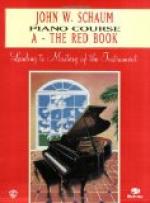“The secret of power lies in relaxation; or I might say, power is relaxation. This word, however, is apt to be misunderstood. You tell pupils to relax, and if they do not understand how and when they get nowhere. Relaxation does not mean to flop all over the piano; it means, rather, to loosen just where it is needed and nowhere else. For the heavy chords in the Tschaikowsky Concerto my arms are absolutely limp from the shoulder; in fact, I am not conscious I have arms. That is why I can play for hours without the slightest fatigue. It is really mental relaxation, for one has to think it; it must be in the mind first before it can be worked out in arms and hands. We have to think it and then act it.
“This quality of my playing must have impressed Breithaupt, for, as you perhaps know, it was after he heard me play that he wrote his famous book on ‘Weight Touch,’ which is dedicated to me. A second and revised edition of this work, by the way, is an improvement on the first. Many artists and musicians have told me I have a special quality of tone; if this is true I am convinced this quality is the result of controlled relaxation.”
I referred to the artist’s hand as being of exceptional adaptability for the piano.
“Yes,” she answered, “and it resembles closely the hand of Rubinstein. This brings to mind a little incident. As a small child, I was taken to London, and on one occasion played in the presence of Rubinstein; he was delighted, took me under his wing, and introduced me all about as his musical daughter. Years afterward we came to New York, and located at the old Clarendon Hotel, which has housed so many men of note. The first day at lunch, my aunt and I were seated at a table mostly occupied by elderly ladies, who stared at us curiously. I was a shy slip of a girl, and hardly ventured to raise my eyes after the first look around the room. Beside me sat a gentleman. I glanced at his hand as it rested on the table—then I looked more closely; how much it reminded me of Rubinstein’s hand! My eyes traveled slowly up to the gentleman’s face—it was Rubinstein! He was looking at me; then he turned and embraced me, before all those observing ladles!”
We spoke of Berlin, the home of the pianist, and of its musical life, mentioning von Buelow and Klindworth. “Both good friends of mine,” she commented. “What a wonderful work Klindworth has accomplished in his editions of Beethoven and Chopin! As Goethe said of himself, we can say of Klindworth—he has carved his own monument in this work. We should revere him for the great service he has done the pianistic world.
“I always love to play in America, and each time I come I discover how much you have grown. The musical development here is wonderful. This country is very far from being filled with a mercenary and commercial spirit. If Europeans think so it is because they do not know the American at home. Your progress in music is a marvel! There is a great deal of idealism here, and idealism is the very heart and soul of music.




